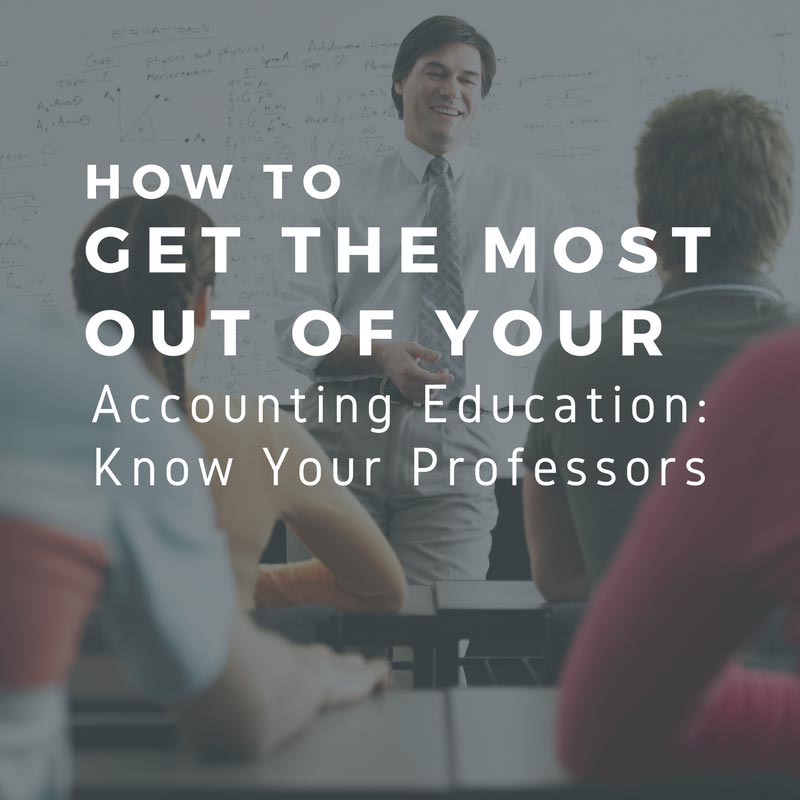Bennet Tchaikovsky, CPA, Esq. is of our guest authors who below gives his reflections on how students can make the most of out of their accounting education. This is a two part article series to assist students with how to interact with accounting professors to be successful in the classroom and setting a solid foundation for the beginning of their accounting careers.
As you are about to start the semester, here are some thoughts on choosing and interacting with your accounting instructors (and all professors for that matter) so that you can leverage their network, experience, and connections.
PART 1: KNOW YOUR ACCOUNTING PROFESSOR AND TAKE THE MOST CHALLENGING COURSES POSSIBLE
As an accounting instructor, my favorite part is assisting current and former students outside of the classroom. Although I am compensated only for teaching, I do my best to assist students with resumes and beginning their professional careers. In addition, what’s equally important is having relationships with accounting firms as I want them to hire students from my school. If I recommend a top student and the student performs well in the workplace, the accounting firms will allow me to recommend other students, which helps me continue to build my professional and alumni network.
Do your research on the professor.
One of my favorite memories teaching at Pasadena City College was on the first day of class. I was asked by a student in front the entire class, “Do you suck as a professor?” Although I was somewhat taken aback, I responded asking if she had seen the movie “Gladiator” (which she had), and indicated to her to gesture with a “thumbs down” if I “sucked” during class.
After that rare accounting class laughter subsided, I then asked her why she asked the question. She indicated to me that I was not on www.ratemyprofessors.com (RMP) and therefore had concerns. Since that instance, I ask students to leave their honest feedback upon course completion on the site. Although not all students leave feedback, many students use RMP and I end up with great classes.
However, not all professors feel this way about RMP. Therefore, you may only see reviews whereby students are looking to vent after receiving a B/B+ but having 89.9% of the points. This is not necessarily the result of a poor instructor; rather only those looking for an emotional outlet. So keep that in mind when doing your research on RMP. But don’t rely on that resource alone.
Understanding your instructor’s professional background and accounting experience is also important.
Start with the faculty webpage and/or any types of professional biographies that can be found via a general web search (e.g. LinkedIn profile). Did the instructor work at an accounting firm (large, medium size or small)? Is your instructor a licensed CPA? You can look up whether or not your instructor is a CPA via your particular state’s board of accountancy website. This is important if you are seeking specific career guidance. Knowing your instructor’s background can give you additional insights as to what to ask and gain knowledge from their experiences.
If you are at a school that firms generally don’t recruit from…
Your relationships with your professors are that much more important as your professors may have the ability to potentially assist you in job placement. Finding a summer leadership program (SLP), internship, and/or full time job is the student’s responsibility and will be easier or harder depending upon your school’s reputation in the accounting community as alumni generally like to recruit from the schools they attended.
Take your classes from challenging instructors.
I teach intermediate, financial, and managerial accounting as well as accounting ethics at Irvine Valley College (“IVC”). My exams generally consist of long complex problems personally written by me. Completing these types of problems was how I was taught as an undergraduate student at the University of California at Santa Barbara (“UCSB”). Also, when students are given a difficult exam and not writing furiously, I can tell who did and who did not study.
While many students find these problems difficult, they later also understand just how valuable this type of testing is. Employers want well educated candidates who know how to approach and solve accounting problems. I have found it personally challenging to test via multiple choice. Multiple choice only works for me when asking definitional questions; but to test whether or not students actually understand concepts is validated through their ability to apply their knowledge to complex problems.
In addition, I also use Roger CPA Review resources in my classroom.
Accounting courses are designed to get you prepared to work professionally, and for many students who are thinking about going on to pursue the CPA designation, they’re able to see how what they’re learning in theory is connected to actual practice by solving real CPA Exam questions. This not only helps them realize that the CPA Exam isn’t as daunting as it’s made out to be, and gives them confidence in their decision to pursue licensure.
So check to see if your professor is using these types of resources in their classrooms as well.
Recruiters often ask me how my students are tested. After explaining how I give exams that are not multiple choice based, but rather designed to test their problem solving abilities, recruiters appreciate this and are more accepting of my students who are taking intermediate accounting.
So make sure you’re following these steps to really get the most out of your accounting education.
You’ll find that it won’t only prepare you for success in the classroom, but, more importantly—outside of it when you’re looking to land your first position at a firm and beyond.
Other articles you may be interested in
Jump Starting Your Accounting Career: For the Community College/Transfer Student
Jump Starting Your Accounting Career: The Interview Process Part I
